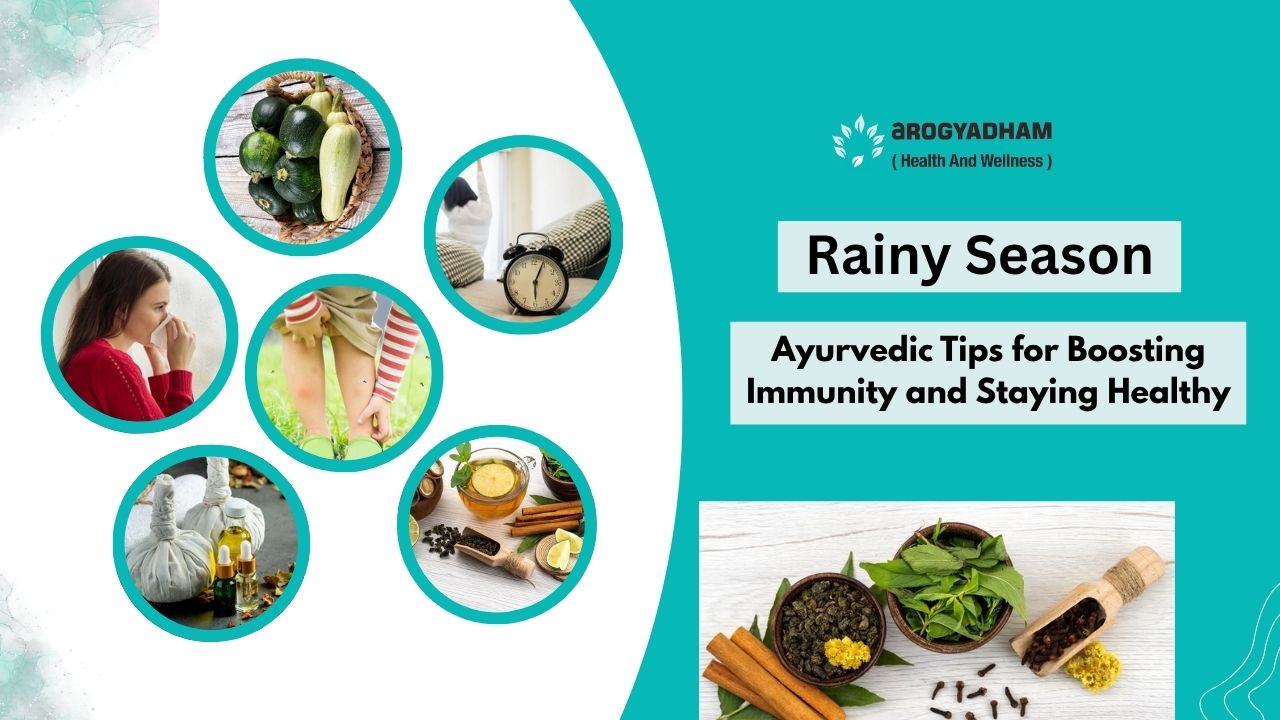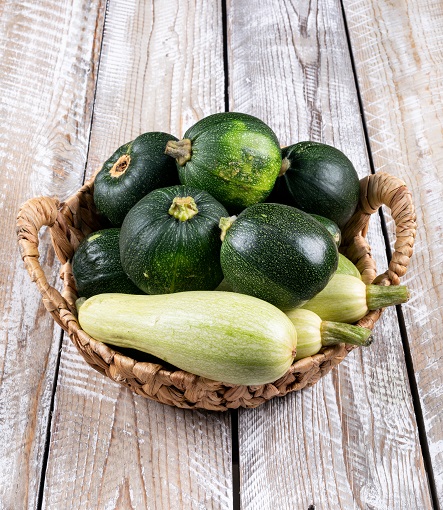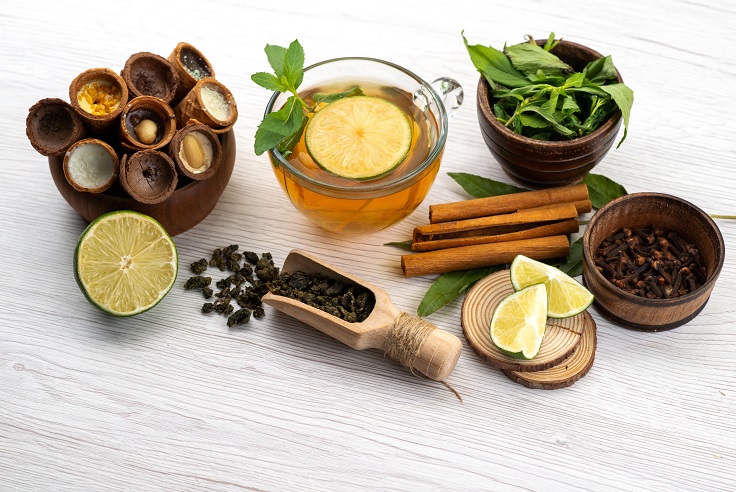Rainy Season – Ayurvedic Tips for Boosting Immunity and Staying Healthy

With the arrival of monsoon weather comes the coolness and freshness that summer weather lacks. While this change in the weather is refreshing, there are some health concerns that are common in monsoon, including cough/cold, skin infections, body pain, and digestive problems. Many individuals report sickness during these months, and the main reason includes the increased amount of moisture in the atmosphere, which can weaken our body and bring our immunity down and allowing for fungal infections, other bacteria, or illness to flourish. Therefore, it is important to make small adjustments in food and daily activities to remain healthy during the months of monsoon.

Following the principles of Ayurveda, which encourages seasonal living, it is quite possible to avoid most of these illnesses during months of rain if we eat a proper diet, follow a daily routine, and do some simple things to care for ourselves. In the blog below, you will learn Ayurvedic tips that are easy to incorporate in order to keep your body strong, your spirit refreshed, and your immunity high during monsoon season.
Ayurveda and Monsoon Season
According to Ayurveda, the rainy season increases the dominance of Vata and Pitta doshas in the body. The digestive fire is weak, increasing susceptibility to digestive disturbances, joint pain, and infections. The excessive humidity can cause fungal and other skin issues, increase waterborne diseases, and aggravate chronic diseases such as arthritis.

Ayurveda advises following a healing lifestyle and diet according to the surrounding nature to maintain dosha balance. This seasonal regimen is known as Ritucharya, which balances and prevents diseases and encourages overall health.
Ayurvedic Dietary Guidelines for Monsoon
The monsoon season typically induces changes in weather along with changes to how our body operates. Our digestion is often slower during the rainy season; thus, it is best to select foods that are light, warm, and easy to digest. According to Ayurveda, we should eat fresh meals that will help to strengthen our digestion and avoid building toxins (Ama) that can lead to illness.
What to Eat During Monsoon

- Grains: Choose light grains that have been stored for a year or more, so they are easier to digest. Old rice, barley, wheat, and corn. These grains provide energy without overburdening the digestive process.
- Pulses: Include protein-rich pulses such as moong dal and masoor dal. These are lighter on the stomach and give strength without bloating.
- Vegetables: Opt for soft, watery vegetables such as bottle gourd, ridge gourd, ash gourd, and pumpkin. These are easy-to-cook meals and easy on the digestion.
- Spices: Use milder spices such as cumin, coriander, ginger, and turmeric. These spices promote digestion, assist your appetite, and guard against the infections that are common during the rainy season.
- Fats: A little bit of ghee is okay because it lubricates the tissue and helps to balance the doshas, and it helps your digestion.
- Herbal Teas: Drinking warm teas made with ginger, tulsi, cinnamon, or cardamom will keep the body warm and increase immunity as well.
Foods to Avoid During Monsoon
Some foods are harder to digest when the humidity is high. Certain foods can pose a larger risk of infection for our gut and health during this time because fungi and bacteria are also active during the rainy season.

- Raw Salads and Leafy Greens: These may be more difficult to digest in this climate because it is moist, and they may have germs, bacteria, or parasites during this time of year.
- Curd and Buttermilk: These dense dairy products add moisture to the body, which increases the chances of developing a cough/cold, or congestion during this time.
- Excessively Oily or Fried Foods: These heavy foods make digestion slower and can lead to bloating and sluggishness.
- Cold Foods and Drinks or Refrigerated: These options cause our digestive fire (Agni) to weaken, which can lead to indigestion or even the formation of toxins.
If you follow these dietary principles and recommended foods, you can support your health and digestion during the monsoon so that you will feel more energised and balanced as you enjoy the rain!
Daily Routine (Dinacharya) for Monsoon Health

A regular daily routine can prevent many imbalances during the monsoon season.
- Wake up Early: The air is fresh, and waking up this early in the summer helps to balance Vata.
- Dry Powder Massage (Udvartana): Used for removing excess oil and/or moisture on the skin and to ward off fungal infections.
- Abhyanga (Oil Massage): A good body oil massage with sesame oil or mustard oil can nourish the skin and lubricate the joints (if the joints feel stiff).
- Warm Water Bath: A bath taken with water boiled with neem leaves or tulsi leaves protects against skin infections.
- Keep Dry: Damp places and spaces promote the growth of fungi and bacteria. Proper ventilation and keeping your living spaces dry are very important.
Immunity Boosting Herbs & Remedies

Ayurveda recommends using certain herbs and formulations to improve your immunity during the rainy season.
- Tulsi (Holy Basil): A natural germicide and a great aid to prevent respiratory problems.
- Giloy (Guduchi): A potent immune-modulator and working towards curing fever and infections.
- Turmeric: Has antibacterial properties that protect against potential attacks by microorganisms.
- Ashwagandha: Will reduce stress levels and improve overall vitality.
- Triphala: A mild detoxifier for digestion and keeping it on track.
Herbal decoctions (Kadha) using tulsi, ginger, black pepper, and cinnamon every day can help build up your resistance to seasonal illnesses.
Common Illnesses during the Rainy Season and the Ayurvedic Remedies
Below are some common Illnesses during the Rainy Season and the Ayurvedic Remedies:
Cold, Cough, and Fever
- Drinking warm water mixed with honey and ginger juice.
- Inhaling steam with eucalyptus or tulsi leaves helps reduce nasal congestion.
- Gargling warm saline water helps relieve a sore throat.
Joint Pains and Muscle Stiffness
- Apply warm sesame oil over the affected area and then a hot pack.
- Eating turmeric and garlic will help reduce the inflammation.
Skin Infections
- Apply a paste of neem and turmeric over the affected areas.
- Taking a bath using neem leaves or triphala powder.
Skin and Hair Care During Monsoon

Having a humid atmosphere in the monsoon can promote skin allergies and hair fall. Ayurvedic care indicates:
- For Skin: Clean with a paste of sandalwood or multani mitti and apply neem oil on itchy skin or infected areas.
- For Hair: Massage the scalp with bhringraj oil or coconut oil mixed with drops of lemon juice. Also, wash with herbal shampoos, such as shikakai or amla.
Yoga and Pranayama for Rainy Season Wellness
Yoga and breathing techniques are excellent ways to help you maintain a balance in your doshas, help with digestion, and calm your mind.
Yoga Postures
- Pawanmuktasana (Wind-Relieving Pose): supportive for digestion.
- Bhujangasana (Cobra Pose): supportive for spine strength during yoga practice and flexibility.
- Trikonasana (Triangle Pose): Improve blood circulation
Pranayama Practices

- Nadi Shodhana (Alternate Nostril Breathing): Supports Vata calming action and supports lung strength.
- Bhramari (Bee Breath): reduces mental stress.
- Kapalabhati: Clear nasal passageways and supportive for digestion.
Panchakarma Detox in Monsoon

The rainy season is the best season to do Panchakarma therapies because it is when the body is in a more natural state to detoxify.
- Virechana (Purgation): To get rid of excess pitta in your body, it also functions as a liver cleanser.
- Basti (Medicated Enema): It is supportive for balancing Vata and all chronic joint problems.
- Nasya (Nasal Therapy): Nasal therapy is great to support eliminating sinus and respiratory problems.
The therapies will rejuvenate the tissue of the body and improve your immunity for the rainy season! All therapies should be under the guidance of a duly qualified practitioner.
Also Read – Panchakarma Treatment Therapy And Its Benefits
Ayurvedic Lifestyle Hacks to Stay Energised During the Monsoon Season
The rainy season can cause you to feel lazy, heavy, or low in energy. Here are a few easy Ayurvedic lifestyle hacks that can help keep you active and healthy through the rainy season.
- Avoid daytime sleeping through the monsoon: Sleeping in the day slows digestion and increases the likelihood of sluggishness, heaviness, or bloating. To keep your energy levels up, try to avoid sleeping in the daytime while also getting the proper rest at night.
- Utilise natural mosquito repellents to prevent diseases: The rainy or damp environment is a prime breeding ground for mosquitoes. Try to use neem oil, citronella, or other natural mosquito repellents to protect yourself against unpleasant mosquito bites and act proactively against serious illnesses, such as mosquito-borne dengue or malaria.
- Keep physical activity to light exercise or gentle movement: This is not a great time to encourage sedentary behaviour, even during the rainy season. However, gentle movement, for example, yoga, stretching, or walking indoors, is all helpful to maintain flexibility, to keep your joints moving, to finish digestion, etc. Continued movement also prevents stiffness and promotes better blood circulation.
So, these Ayurvedic lifestyle hacks during the rainy season can help you to be better balanced, energised, and entirely aware of any seasonal health problems.

Conclusion
The monsoon is a great relief, but it does have new health issues. Humidity, digestive issues, low immunity, and lots of infections. Thankfully, Ayurveda offers simple and effective ways to help you navigate the weather changes.
At Arogyadham Health & Wellness, we are committed to providing support for your entire health and wellness with timeless Ayurvedic practices. It can be the small changes you make in your diet and daily habits, such as eating warm, light foods, keeping dry, gentle yoga, and taking immunity-boosting herbs, that can really make a difference. And it is these changes that will help build digestion, energy, and your natural defence system.
To be aware of your well-being is a way to live in harmony with nature. The monsoon is often a time of cleansing. It is an opportunity to cleanse dietary habits and methods and nourish the immune system to help you build resilience. Let this time be about inner clearing, not illness.
At Arogyadham Health & Wellness, our trained Ayurvedic doctors can provide you with the best well-being support, with customized advice through this rainy season and beyond. Embrace the power of Ayurveda to create a time of healing and balance in your life through the monsoon season.
Be well. Stay protected. Let nature work for you—not against you—this Monsoon season.
FAQ
Q1. Can I take curd in the monsoon?
Answer: It is better to avoid it, as it increases moisture in the body and creates breathing problems.
Q2. Is monsoon a good time to do Panchakarma?
Answer: Yes, kidneys, bladder, etc., are more open, giving a better response to detox therapies.
Q3. What is a simple home remedy for a monsoon cough?
Answer: A decoction (kadha) of tulsi, ginger, and black pepper is boiled with water.
Q4. How to manage joint pain in the monsoon?
Answer: A consistent abhyanga with sesame oil and consumption of turmeric milk is to be done.
Q5. What are some tips to help your skin care regimen during the monsoon season?
Answer: Keep skin clean and dry; wash face two times a day; do not use heavy creams; use natural ingredients such as neem or sandalwood to prevent pimples and infection; and wear light and breathable clothing to prevent skin rashes.
Q6. Can I drink buttermilk in the rainy season?
Answer: Yes, in moderation, and add a pinch of rock salt and roasted cumin to it to help digestion.
Q7. What should I not eat during the rainy season?
Answer: You should not eat leafy greens, uncooked sprouts, seafood, and fermented foods.
Q8. Is it safe to eat honey during the rainy season?
Answer: Yes, raw honey is good for immunity and managing cough and cold.
Q9. Can I do yoga in the rainy season?
Answer: Yes, practicing indoors with some gentle yoga (pranayama and some stretching) can help circulation and lung functioning.
Q10. Is it safe to protect skin against fungal infections in the rainy season?
Answer: Keep skin dry, use neem or sandalwood powder, and wear breathable fabric.
Q11. Is it safe to drink cold water in the rainy season?
Answer: No. Drink warm or room temperature water for better digestion and for a sore throat.
Q12. Can the rainy season lead to hair fall?
Answer: Yes, it can be from the humidity. Make sure to oil the scalp regularly and wash hair with a gentle herbal shampoo.
Q13. How can I maintain stamina in the rainy season?
Answer: Keep meals light and warm to eat, and add herbs of ashwagandha and ginger to your meals for stamina.
Q14. Should I reduce physical activity in the rainy season?
Answer: Not necessarily. Engaging in light physical activity like yoga indoors should keep your joints limber and uplift your mood.
Ready to Heal Naturally?

Share With
Friends

Dr. Rakesh Agarwal, a third-generation Ayurveda expert and research scholar, treats chronic ailments through Ayurveda and Panchakarma. He is also the founder-editor of Arogyadham Magazine, promoting Ayurveda and wellness to over a million readers since 1992.

Dr. Arjun Raj, an Ayurvedic physician and wellness expert, is the Director of Arogyadham Health Care and serves on the executive board of Arogyadham Health and Wellness. He blends traditional Ayurveda with modern wellness to promote balanced, healthy living.

Dr. Amrit Raj, an Ayurvedic doctor and certified yoga teacher, is the Director of Arogyadham Health and Wellness. He specializes in chronic conditions and actively promotes Ayurveda and yoga worldwide for healthier living.










